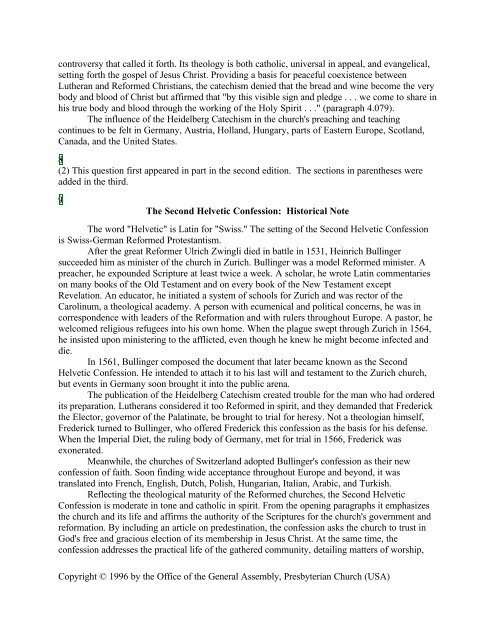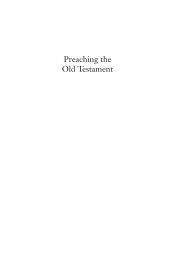The Book of Confessions - The Presbyterian Leader
The Book of Confessions - The Presbyterian Leader
The Book of Confessions - The Presbyterian Leader
Create successful ePaper yourself
Turn your PDF publications into a flip-book with our unique Google optimized e-Paper software.
controversy that called it forth. Its theology is both catholic, universal in appeal, and evangelical,<br />
setting forth the gospel <strong>of</strong> Jesus Christ. Providing a basis for peaceful coexistence between<br />
Lutheran and Reformed Christians, the catechism denied that the bread and wine become the very<br />
body and blood <strong>of</strong> Christ but affirmed that "by this visible sign and pledge . . . we come to share in<br />
his true body and blood through the working <strong>of</strong> the Holy Spirit . . ." (paragraph 4.079).<br />
<strong>The</strong> influence <strong>of</strong> the Heidelberg Catechism in the church's preaching and teaching<br />
continues to be felt in Germany, Austria, Holland, Hungary, parts <strong>of</strong> Eastern Europe, Scotland,<br />
Canada, and the United States.<br />
8<br />
(2) This question first appeared in part in the second edition. <strong>The</strong> sections in parentheses were<br />
added in the third.<br />
9<br />
<strong>The</strong> Second Helvetic Confession: Historical Note<br />
<strong>The</strong> word "Helvetic" is Latin for "Swiss." <strong>The</strong> setting <strong>of</strong> the Second Helvetic Confession<br />
is Swiss-German Reformed Protestantism.<br />
After the great Reformer Ulrich Zwingli died in battle in 1531, Heinrich Bullinger<br />
succeeded him as minister <strong>of</strong> the church in Zurich. Bullinger was a model Reformed minister. A<br />
preacher, he expounded Scripture at least twice a week. A scholar, he wrote Latin commentaries<br />
on many books <strong>of</strong> the Old Testament and on every book <strong>of</strong> the New Testament except<br />
Revelation. An educator, he initiated a system <strong>of</strong> schools for Zurich and was rector <strong>of</strong> the<br />
Carolinum, a theological academy. A person with ecumenical and political concerns, he was in<br />
correspondence with leaders <strong>of</strong> the Reformation and with rulers throughout Europe. A pastor, he<br />
welcomed religious refugees into his own home. When the plague swept through Zurich in 1564,<br />
he insisted upon ministering to the afflicted, even though he knew he might become infected and<br />
die.<br />
In 1561, Bullinger composed the document that later became known as the Second<br />
Helvetic Confession. He intended to attach it to his last will and testament to the Zurich church,<br />
but events in Germany soon brought it into the public arena.<br />
<strong>The</strong> publication <strong>of</strong> the Heidelberg Catechism created trouble for the man who had ordered<br />
its preparation. Lutherans considered it too Reformed in spirit, and they demanded that Frederick<br />
the Elector, governor <strong>of</strong> the Palatinate, be brought to trial for heresy. Not a theologian himself,<br />
Frederick turned to Bullinger, who <strong>of</strong>fered Frederick this confession as the basis for his defense.<br />
When the Imperial Diet, the ruling body <strong>of</strong> Germany, met for trial in 1566, Frederick was<br />
exonerated.<br />
Meanwhile, the churches <strong>of</strong> Switzerland adopted Bullinger's confession as their new<br />
confession <strong>of</strong> faith. Soon finding wide acceptance throughout Europe and beyond, it was<br />
translated into French, English, Dutch, Polish, Hungarian, Italian, Arabic, and Turkish.<br />
Reflecting the theological maturity <strong>of</strong> the Reformed churches, the Second Helvetic<br />
Confession is moderate in tone and catholic in spirit. From the opening paragraphs it emphasizes<br />
the church and its life and affirms the authority <strong>of</strong> the Scriptures for the church's government and<br />
reformation. By including an article on predestination, the confession asks the church to trust in<br />
God's free and gracious election <strong>of</strong> its membership in Jesus Christ. At the same time, the<br />
confession addresses the practical life <strong>of</strong> the gathered community, detailing matters <strong>of</strong> worship,<br />
Copyright © 1996 by the Office <strong>of</strong> the General Assembly, <strong>Presbyterian</strong> Church (USA)




